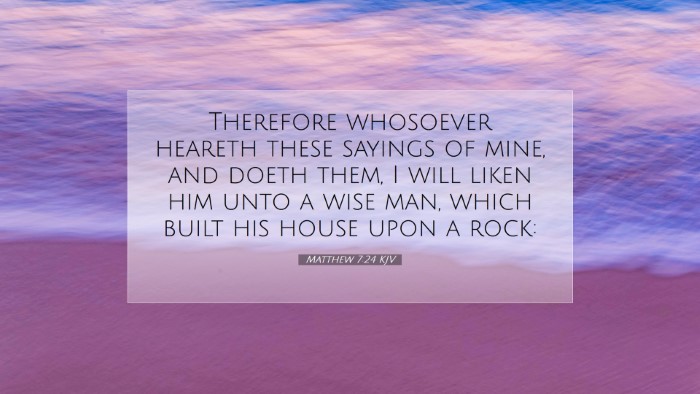Commentary on Matthew 7:24
Scripture Reference: Matthew 7:24 (KJV): "Therefore whosoever heareth these sayings of mine, and doeth them, I will liken him unto a wise man, which built his house upon a rock."
Introduction
This verse, as part of the Sermon on the Mount, serves as a profound conclusion to the teachings of Jesus regarding the importance of acting upon His words. It stands as a pivotal moment where Jesus distinguishes between the wise and the foolish, urging His followers to live out their faith actively.
Exegesis
Matthew Henry notes that the metaphor of building a house represents the construction of one’s life. The foundation of this life—whether on rock or sand—determines the stability during life's storms. The "rock" symbolizes Christ Himself, the truth of His teachings, and a life aligned with them.
Albert Barnes elaborates on this by indicating that the wise man represents those who hear Jesus’ words and faithfully implement them. Hearing alone is inadequate; it must be accompanied by obedience. Barnes emphasizes that the strength of one's life is contingent upon the principles one follows—the foundation laid by Christ's teachings.
Adam Clarke suggests that the "wise man" denotes not only the one who hears but also the one who acts. He reminds us that the emphasis Jesus places on doing the will of God is critical in understanding true discipleship. The wise man's life, built on obedience, contrasts starkly with that of the foolish man, who ignores the teachings.
The Importance of Hearing and Doing
- Hearing: Simply hearing the words of Jesus is insufficient. The emphasis is placed on active listening that leads to understanding and transformation.
- Doing: True discipleship is demonstrated through obedience. It is in the doing that faith is validated and demonstrated.
The Foundation: Rock vs. Sand
The imagery of the rock versus sand signifies the enduring nature of faith in Christ versus the ephemeral nature of worldly philosophies and practices. Henry asserts that building on the rock signifies having a firm doctrinal understanding that can withstand trials and tribulations of life.
Barnes highlights that the "house" symbolizes one’s life, family, or ministry, necessitating a strong foundation rooted in Christ. The storms mentioned are indicative of the various trials and adversities that believers face. The stability of the house—their way of life—depends on the quality of the foundation.
Application for Believers
Clarke points out that this passage is applicable not only for individual lives but also for communities of faith. Churches are built upon the foundation of Christ's teachings, and their health and longevity depend on collective adherence to His principles.
- Personal Reflection: Believers are encouraged to self-reflect on their foundations. Are they grounded in the teachings of Christ, or are they swayed by transient cultural norms?
- Community Implications: Pastors and church leaders should consider the collective adherence of their congregations to the teachings of Christ, investing in teaching that emphasizes both hearing and doing.
Conclusion
Matthew 7:24 encapsulates a critical principle of Christian living. The life built on the teachings of Jesus will stand firm against the trials that life throws its way. It calls for introspection and action, transforming hearers into doers, wise builders on the firm foundation of Christ. The inquiries left for each believer center on obedience, the quality of their foundation, and the fruitful application of the wisdom embedded in Christ’s words.
Ultimately, the teachings of Christ are not mere philosophical ideas but actionable truths that invite believers into a robust relationship with Him, resulting in lives that reflect His glory and withstand the tempests of life.


